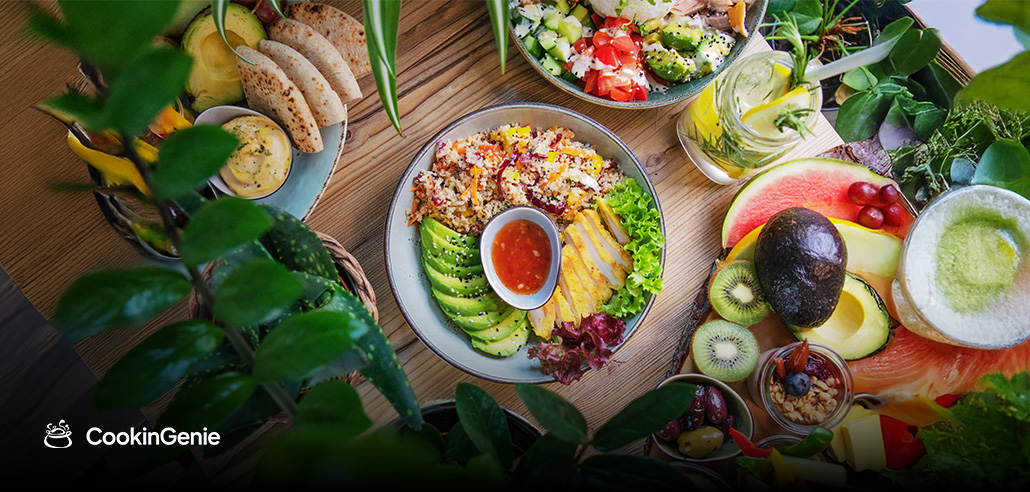How Eating with the Climate in Mind Can Help You Live Longer and Healthier?
In recent years, there has been a growing awareness of the environmental impact of our food choices, with many people seeking ways to eat more sustainably. But the benefits of eating with the climate in mind go beyond just reducing our carbon footprint. Research shows that a diet that prioritizes plant-based, whole foods and minimizes processed and packaged foods can also have significant health benefits, from reducing the risk of chronic diseases to improving overall well-being.
In this blog, we’ll explore the connections between our food choices, the environment, and health and provide practical tips and strategies for eating with the climate in mind. Whether you’re a seasoned environmentalist or just starting to learn about sustainable eating, this blog will provide valuable insights into how eating with the climate in mind can help you live a longer, healthier life while protecting the planet for future generations.
About Eating with the Climate in Mind
At its core, eating with the Climate in Mind is about reducing our impact on our shared environment by being thoughtful and informed about what we eat every day. In other words, it’s about how we nourish ourselves and consider impacting environmental resources.
It means making conscious decisions when purchasing food because what goes into your shopping cart affects our planet’s health, now and for future generations. Such choices could involve:
- Eating locally grown produce instead of flying fruits from halfway around the world.
- Avoid processed foods that contain added sugar, sodium, unhealthy fats, preservatives, or artificial ingredients.
- Selecting seafood such as wild-caught Alaskan salmon over farmed fish from abroad.
- Electing to purchase organic dairy products over conventional dairy items.
- Choosing grass-fed beef instead of corn-fed beef.
- Selecting produce that is seasonal rather than buying out-of-season fruit or vegetables shipped from elsewhere.
- Avoid single-use plastic packaging (like individual yogurt cups) when buying larger containers that use less plastic overall.
Benefits of Eating with the Climate in Mind
Eating with the Climate in Mind is about reducing our environmental impact and making healthier and more conscious choices that benefit us and the world. By supporting local, sustainable food systems, we can help protect biodiversity, enjoy better-tasting and more nutritious food, and build a healthier and more resilient community. It’s a win-win for everyone.
Let’s explore some benefits of eating with the climate in mind and why it’s worth considering as part of our lifestyle.
Protecting Biodiversity
Choosing sustainable food and minimizing animal product consumption can help protect the environment and promote biodiversity. Large-scale farming practices, deforestation, and monoculture can disrupt habitats, displace wildlife, and even lead to extinction. Eating locally grown, seasonal produce can also support local farmers and preserve the natural landscape.
Better Taste and Nutrition
Locally sourced food tends to be fresher, tastier, and more nutrient-dense than store-bought items that may have traveled long distances and undergone extensive processing. We can enjoy fresh, flavorful, and nutritious food by supporting local farmers.
Building a Healthier Community
By supporting local farmers who use sustainable methods, we can contribute to their success and help build a healthier, more resilient community. Local food systems also create jobs and support local economies, which can ripple effect on the entire region.
Decrease Your Environmental Impact
It’s no secret that today’s world is rapidly becoming more environmentally conscious. We all have a responsibility to do our part in reducing our lifestyles’ negative impact on the earth, but there are also plenty of little things we can do every day to make a more significant difference. Eating locally and seasonally produced food, reducing or eliminating meat and dairy intake, and shopping at farmer’s markets are just a few ways to start making an environmental impact.
Eat Locally and Seasonally Produced Foods
Eating locally and seasonally produced food can have numerous benefits. Eating locally grown and in-season produce can support ethical farming practices, reduce carbon footprint, and enjoy fresh and delicious food.
One way to find locally and seasonally produced food is to visit your local farmer’s market or join a CSA. A CSA (community-supported agriculture) program allows you to purchase food directly from local farmers who often use organic or sustainable farming methods.
Doing so, you support small-scale farmers and help them maintain a livelihood. In addition, food purchased from a farmer’s market or through a CSA is usually fresher and of higher quality than you may find at a traditional grocery store. Plus, you can save money on your grocery bill since prices are often lower than at a grocery store.
Reduce or Eliminate Meat and Dairy Intake
Reducing or eliminating meat and dairy intake is another excellent way to decrease environmental impact. The global livestock industry accounts for 14% of all human-induced carbon emissions — not to mention the amount of water it takes to raise these animals for food production.
Reducing your consumption by just one meal per week could significantly reduce your carbon footprint. Adopting a plant-based diet or trying vegetarian meals here and there is entirely up to you.
Choose Whole Foods
Whole foods are minimally processed and have a lower carbon footprint than processed and packaged foods. They also require less energy to produce and transport. Eating more whole foods is also beneficial for your health, as they are often more nutrient-dense than processed foods.
Minimize Food Waste
Food waste significantly contributes to greenhouse gas emissions, generating methane in landfills. To reduce food waste, plan your meals ahead of time, store food properly, and use leftovers creatively. You can also compost food scraps to reduce waste even further.
Buy Organic and Non-GMO Products
Organic and non-GMO products are grown without harmful pesticides and fertilizers that can damage the environment. These products are also less likely to be genetically modified, which can negatively impact biodiversity. Buying organic and non-GMO products supports sustainable farming practices and helps to reduce the use of harmful chemicals in agriculture.
Use Reusable Containers
Reusable containers, such as glass jars, metal tins, and fabric bags, can significantly reduce packaging waste. Single-use plastics significantly contribute to environmental pollution, and using reusable containers can help reduce your ecological impact.
Avoid Single-Use Plastics
Single-use plastics, such as straws, utensils, and plastic bags, harm the environment. Opting for reusable alternatives, such as metal or bamboo straws, silverware, and cloth bags, can help to reduce your environmental impact.
Support Sustainable Agriculture
Choosing food products certified as sustainably produced, such as Rainforest Alliance or Fair Trade, ensures that the products are made using sustainable farming practices that are better for the environment. Supporting sustainable agriculture helps to reduce the environmental impact of food production.
Reduce Consumption of Processed Foods
Processed foods often contain added preservatives and artificial ingredients that require a lot of energy to produce. Opting for whole foods whenever possible is a great way to reduce environmental impact and improve overall health.
Improve Your Health and Longevity
Eating with the climate in mind not only helps the environment but can also have significant health benefits. Let’s know how climate-conscious eating can improve your health and longevity.
Provides Nutritious Foods
Choosing environmentally sustainable foods can also be an excellent way to ensure you are consuming a nutrient-dense diet. Opting for plant-based foods such as fruits, vegetables, whole grains, nuts, and seeds can provide a wide range of essential nutrients, including vitamins, minerals, fiber, and antioxidants. These foods are often lower in calories and saturated fat than animal-based foods and can help promote overall health and well-being.
Lower Risk of Chronic Diseases
Reducing your intake of meat and dairy products can also have significant health benefits. Studies have shown that a plant-based diet can reduce the risk of chronic diseases like heart disease, diabetes, and certain cancers.
Plant-based diets tend to be higher in fiber, vitamins, and minerals while lower in saturated fat and cholesterol, linked to increased disease risk.
Lower Intake of Harmful Chemicals
Organic and locally grown produce can reduce exposure to harmful chemicals such as pesticides and herbicides. These chemicals can have adverse health effects, including increased cancer risk and other chronic diseases.
More Antioxidants
Plant-based foods such as fruits, vegetables, nuts, and seeds are rich in antioxidants, which help protect your cells from damage caused by harmful molecules known as free radicals. Eating a diet of antioxidants can help lower your risk of chronic diseases, including heart disease and cancer.
Reduces Inflammation
Consuming a plant-based diet can help reduce inflammation in the body, which is linked to various chronic diseases, including heart disease and diabetes.
Boosts Immunity
Plant-based foods are rich in vitamins, minerals, and phytochemicals that can help boost your immune system. Consuming a diet high in these nutrients can help protect against illness and disease.
Conclusion
In conclusion, adopting a climate-conscious diet is a crucial step toward mitigating the harmful effects of climate change. By making informed food choices and reducing our consumption of meat and dairy products, we can significantly reduce our carbon footprint and contribute to a more sustainable future.
In addition to making these changes in our lives, seeking a private chef’s assistance can also be a valuable strategy for incorporating more environmentally friendly meals into our diets.
A private chef can help us plan and prepare meals by prioritizing locally-sourced, seasonal, and plant-based ingredients, minimizing our reliance on resource-intensive animal products, and reducing food waste.
By working with a private chef who shares our commitment to sustainable eating, we can ensure that our dietary choice.



 Settings
Settings
 Gift Card
Gift Card Blog
Blog Locate Us
Locate Us










 Home
Home
 Chefs
Chefs
 Chats
Chats
 My Order
My Order



